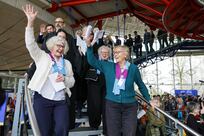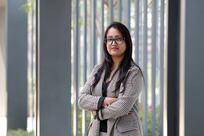"As long as God leaves us absorbed in our own suffering we remain sterile, nailed to ourselves. As soon as compassion brings us beyond ourselves to another's suffering than our own, we enter into the science of compassion experientially, we discover wisdom in it. In the immortal company of all creatures purified by angelic and human trial we glimpse the joy of tomorrow through the pain of today." - Louis Massignon
Abdel Halim Mahmud (1910-1978) returned from Paris in 1940 with a PhD in philosophy. At the Sorbonne he had studied psychology, anthropology and sociology under the renowned French scholar Louis Massignon. But before ever leaving Egypt he had completed his Islamic studies at Azhar and was awarded the Alamiyyah certificate, one of the youngest to do so in modern times. In 1973, he was appointed to the position of Sheikh al Azhar, the highest religious position in Egypt. However, because of the institution's pre-eminence and history, it becomes perhaps the highest religious position in the Muslim world. To this day he is revered and loved throughout the Muslim world as a profound intellectual and extraordinary social leader.
Three elements of his approach made Abdel Halim Mahmud so significant and effective. First, he combined traditionally grounded authenticity with a conversance in contemporary global intellectual trends. This authenticity gave him credibility with the Muslim public as well as a means to model intrinsic cultural autonomy while engaging in world issues on the terms of the international community. It was his involvement with international institutions that enabled the latter and modelled a new openness for Muslims to participate with confidence in the global community.
Second, he revived the relationship of jurisprudential policy and regulation with the Islamic tradition of spiritual ethics. The mechanical body of the law would no longer be without a soul, but rise to its calling of reinvigorating fairness, goodness, and purposeful leadership in society. Third, he was always conscious of a local-global big picture and inspired a generation to be participants in that bigger picture.
In her 2005 article on the intellectual legacy of AH Mahmud, the Oxford academic Hatsuki Aishima, highlights his spiritually informed approach, which he termed the "Way of Continuity", as being comprised of three elements: knowledge, action and devotion. Knowledge implies an emphasis on education and intellectual erudition. Action, as positive and constructive civil engagement, informs his formulation of the meaning of "jihad". And devotion grounds ethics in religious commitment and spiritual vision and praxis. Through this approach, she points out, he was able to reinvigorate al Azhar as a significant cultural, educational, and intellectual institutional leader.
A robust Azhar makes for a healthy and balanced Muslim world. With the office of Sheikh al Azhar vacant, Egypt is under pressure to make a courageous and visionary choice. Muslims are looking for cultural leaders who can show them how to participate in the global public square in ways that are significant, honest, and true to their own identity. A burgeoning youth population figures significantly in this equation along with their concerns for livelihood, education, security, and cultural integrity.
With no one to champion their cause, they become frustrated, cynical, and feelings of disenfranchisement prevail. Many will become disaffected; some may even turn to vigilantism - which by the way is prohibited in Sharia. But it is not enough to tell them that it is wrong; someone needs to show them how "right" can bring tangible improvements. But more than this, we need an Azhar that can deliver on still more civilisational objectives; social balance, global participation, and cultural significance.
Jihad Hashim Brown is director of research at the Tabah Foundation. He delivers the Friday sermon at Maryam bint Sultan Mosque in Abu Dhabi





